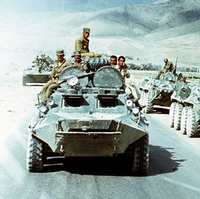The 2014 Afghan security plan unveiled by President Hamid Karzai this week at the international conference in Kabul raises once again the question of whether the U.S. and NATO are moving towards a 21st century variant of the "Najibullah strategy" as they seek to determine their end game in Afghanistan.
The reference is to the regime of Mohamed Najibullah, the Afghan leader at the time the Soviet Union withdrew its combat forces from Afghanistan in 1989. The Afghan government that the Soviets left behind controlled the major population centers as well as some of the rural regions of the country, primarily in the non-Pashtun north and west, and had a tenuous hold over the major lines of communication. The Najibullah regime had inherited a generous amount of military equipment, including aircraft and even SCUD missiles. The government in Kabul was also heavily subsidized by Moscow, subsidies that helped it secure the support of local powerbrokers and purchase the allegiance of insurgent commanders.
Soviet training had produced an Afghan army that, contrary to all predictions and expectations, was able to halt and throw back a major mujihadeen assault that had been expected to quickly take Kabul and drive out the Soviet-backed government. That victory at Jalalabad boosted morale for government forces, leading them to reassess Najibullah's prospects for survival.

